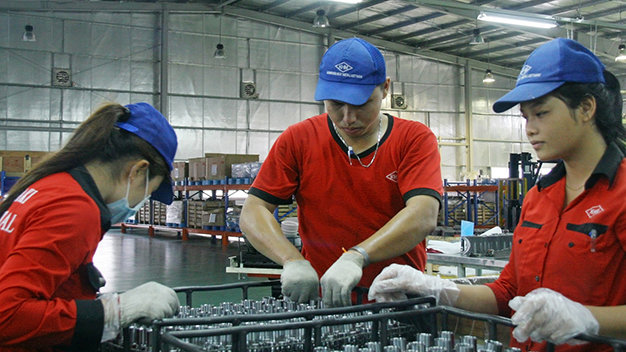The Hong Kong and Shanghai Banking Corporation (HSBC) has announced that it will stop publishing the Purchasing Managers' Index (PMI) for Vietnam after five years of offering it for free for the Southeast Asian country, along with others worldwide.
>> An audio version of the story is available here
With the announcement released on Monday along with the HSBC Vietnam Manufacturing PMI for May 2015, Vietnam will no longer receive the PMI starting next month.
This will be the final HSBC PMI index published in Vietnam and other countries, HSBC said in a press release.
PMI comprises of many economic indicators derived from monthly surveys of companies from the private sector conducted by Markit Group, which prepares PMIs for over 30 countries worldwide, and the Institute for Supply Management (ISM), which provides PMIs for the U.S.
The Vietnam Manufacturing PMI, a composite index of five sub-indicators including production level, new orders from customers, supplier deliveries, inventories and employment level, have been conducted by Markit for the last five years.
The collaboration with Markit to carry out the PMI surveys has been a success, HSBC said without citing the main reason for the move.
In the last Vietnam Manufacturing PMI, it is reported that growth in the Vietnamese manufacturing sector gathered pace in May, with rising client demand leading to record expansion of output and new orders.
Moreover, the rate of job creation also picked up during the month.
Meanwhile, input costs increased for the first time in seven months, but firms continued to lower their output prices, said the report.
The headline seasonally-adjusted PMI – a composite indicator designed to provide a single-figure snapshot of operating conditions in the manufacturing economy – rose for the second month, running to 54.8 in May, up from 53.5 in April.
The marked improvement in operating conditions signaled by the latest reading was the strongest since the series began in April 2011. Business conditions have now improved in each of the past 21 months.
Central to the marked strengthening of the sector’s health was a record increase in new business, as respondents indicated that the rise mainly reflected a greater need for products among customers.
New export orders also rose, albeit at a much weaker pace than seen for total new business.
As client demand increased, manufacturers raised production accordingly, resulting in increased output for the twentieth month in a row, and at the strongest pace in the series history, said the report.
The Vietnamese manufacturing sector gained further momentum in May and growth rates are now the best in four years of data collection so far.
“Central to the recent success of firms in Vietnam has been their ability to secure new work in a competitive environment, and the recent 1 percent devaluation of the dong against the US dollar by the State Bank of Vietnam should help efforts to maintain international competitiveness,” said Andrew Harker, senior economist at Markit.
“On the other hand, some firms did report a rise in costs as a result of the weaker currency, leading to a first rise in input prices in seven months,” he added.
Like us on Facebook or follow us on Twitter to get the latest news about Vietnam!




















































